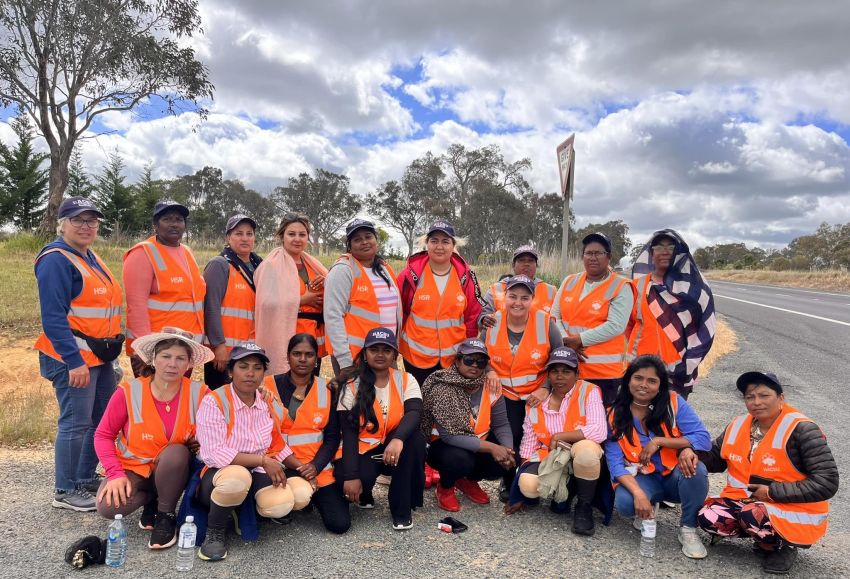
Refugees will converge on Parliament House lawns on October 17 to again call for permanent visas. People born here will be among them. More than 12,000 refugees are seeking permanent visas.
Tamil cricket star Thienushan Chandrasekaram will have completed his bike ride for freedom from Meanjin/Brisbane. (He would already be playing cricket for Australia if his visa status permitted.)
The next day, 21 Tamil and Iranian women will have completed their epic 640 walk from Immigration Minister Andrew Giles’ office in Naarm/Melbourne.
Given that there are now no more refugee children on Christmas Island or Nauru, doesn’t that mean Labor has dialled back the cruelty? Not really.
The families and individuals who will gather are part of a 12,000-strong group who are either on temporary visas, or don’t have visas at all.
They may work and pay tax here, but they still need permanent visas to qualify for the jobs, housing, courses and family catch-ups they dream of. Others have gone decades without access to support services.
A flurry of announcements by Immigration Minister Andrew Giles and Home Affairs Minister Clare O’Neil promised faster asylum claim processing for new arrivals. But these same ministers have labelled some of those whose cases have been under review for a decade as “false refugees”.
Worse, Giles’ announcement lacked detail about the way in which claims would be “sped up” and the criteria to be used. This lack of transparency leaves applications as something of a lottery.
Giles and O’Neil need to do better than demonise victims of the flawed “fast track” process as “over-stayers” or “rejects”: they have the power to change lives for the better.
Moreover, sending 11 people to Nauru this month does not dismantle the damage done to those people who were previously held and harmed offshore.
Some survivors of the terrible abuse on Manus and Nauru are still on temporary visas: they have suffered more than 11 years of punishment, just for being a refugee.
Safe third countries are beside the point: these people are Australians. Some, like Thanuraj Selvarasa, will be speaking on October 17.
Thanuraj was among the many people beaten with iron bars in the detention centre on Manus in November 2017, while Australian officials looked on.
Labor rhetoric that echoes the Coalition’s “sovereign borders” sloganeering is harmful.
Eleven years ago, the “Fast Track” claims for asylum were often dismissed too hastily. The rejections can be explained by racial prejudice, a harsh Border Force culture and security hyper-vigilance, a flawed character assessment processes, and the lack of documentation or incomplete intelligence about conditions in the country of origin. Every Muslim is treated as suspicious.
Overall, the asylum seeker processing system is too arbitrary. A young man selected for offshore may be the twin of a person kept in detention onshore. One twin will get permanent residency quite smoothly, while the other will not. It is striking that two people who came from the same war-torn city and arrived by the same means on the same day are treated differently.
Is it even possible that the mood of departmental individuals assigned to the interview contributes to the refugee’s outcome. Some refugees have that impression.
It is striking that some immediate family members receive citizenship ahead of others when all have fled the same situation. Timing and means of arrival do not determine need.
Often the legal processes fail refugees. Almost every person on a temporary visa long-term, who put their case through the courts under the former Coalition government, seems to have gotten nowhere at great expense. Documentation and language barriers do not help.
I’ve witnessed correspondence showing unprofessional conflicts between barristers and lawyers that have not helped their refugee clients. Cases fall apart and yet fees are charged.
A costly, but broken, legal appeal process does not work for one of many common reasons. The criteria for ministerial intervention applications are also less than clear.
Only certain types of voluntary service or participation, for example, meet the requisite high standard for community endorsement. Sponsorships are yet another imposition on loyal supporters.
Applicants may still remain vulnerable to torture or death in their country of origin. Politics in some countries has grown more polarized across the past decade.
Women who have relished a more empowered and secular way of life fear going back to Iran to face harsh hijab enforcement or punishment. Afghan Hazaras face even greater danger now than 14 years ago.
[The Canberra Refugee Convergence starts on October 17 at 10am and runs until October 18. Jane Salmon is a refugee advocate.]